Pagliacci – West Green House Opera
(Summer 2023)
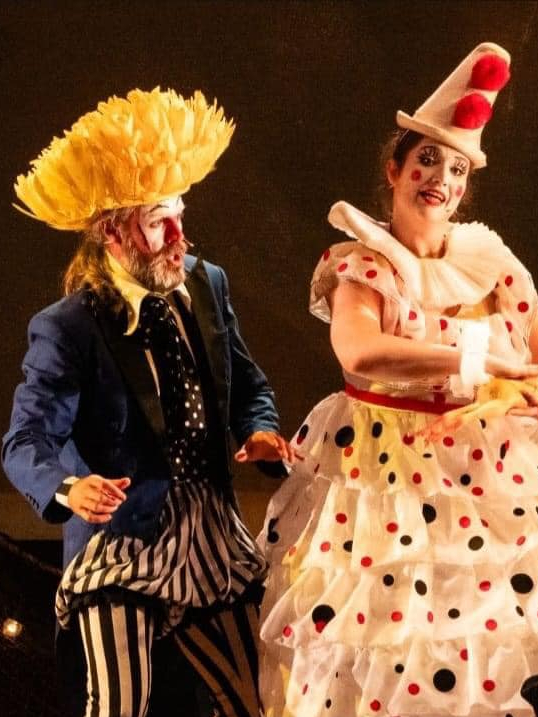
“…but it is Grant Doyle’s Tonio who really stands out as he combines a secure and assertive baritone with a convincingly disturbed and determined persona..”
Sam Smith MusicOMH
…but it is arguably Grant Doyle’s bitter and menacing Tonio who seals the deal: his notorious final line is quite properly devastating”
The Stage, George Hall, 31 July 2023
As I have said, Grant Doyle was a [truly nasty] piece of work as Tonio. He began, in modern dress as the prologue, engaging and toying with us as he described what the author hoped to achieve. Doyle is a consummate communicator, and if his voice is not the warmest Italian baritone that did not matter as here he was vividly talking to us. His Tonio was a nasty sneak, managing to make much of relatively small business and ensuring he had our attention.
planethugill.com, 31 July 2023
La Cenerentola – Nevill Holt Opera
(Summer 2023)
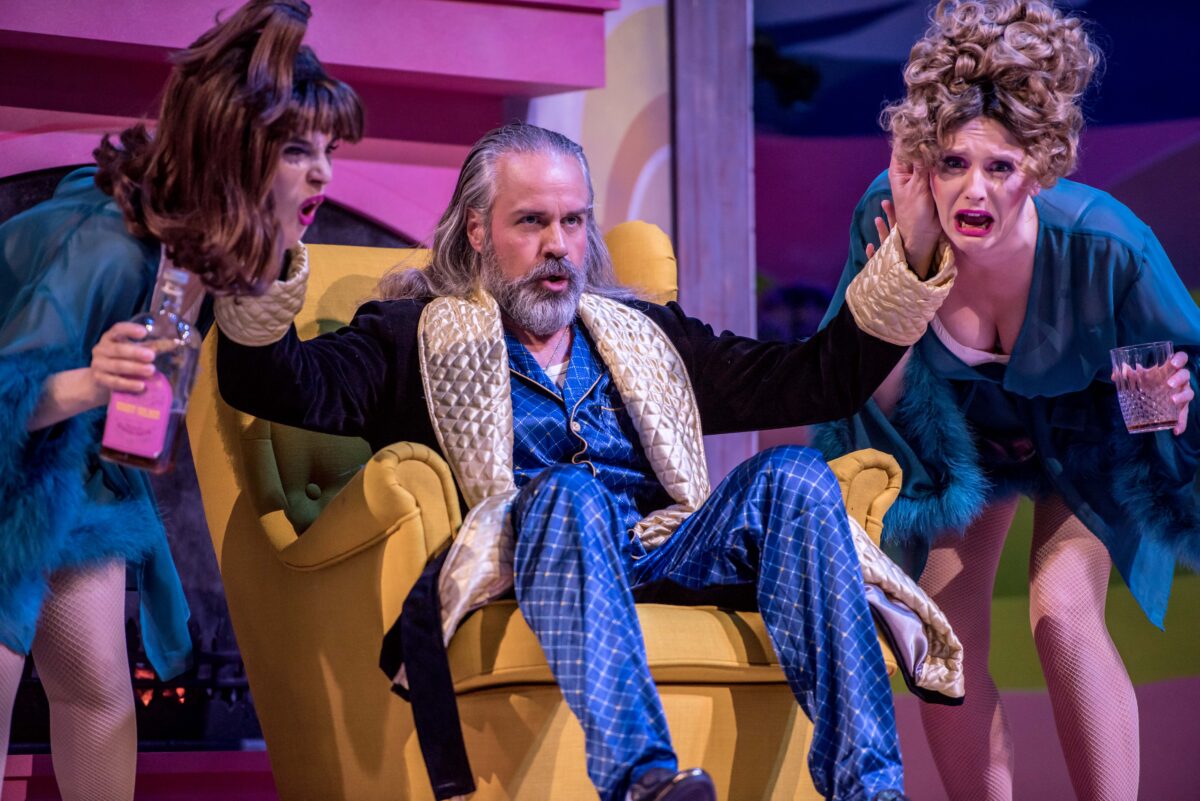
The best of the principals, though, is Grant Doyle’s expertly crafted Don Magnifico. He alone maintains a three-dimensional character –a thoroughly dislikable one, but he’s meant to be –thus fulfilling the old dictum that comedy is a serious business; the reason Doyle is funny is that he plays the wicked stepfather for real. Spot-on diction too
George Hall, The Stage
…Doyle is simply the class act of the evening. His own baritone is immensely rich and secure, and he captures the humorous and sinister aspects of the character in equal measure. When he claims his third daughter has died, it is amusing to see him clutch a vase on the mantlepiece as he pretends it is an urn containing her ashes. At the same time, when he rips a page from Alidoro’s book that
Sam Smith MusicOMH
refers to this child and throws it in the fire, it is a sign to Angelina that she really is worth more to him dead than alive.
As Don Magnifico, Grant Doyle was superb. He provided vocal gravitas to a role that can sometimes be played too much for laughs, and his incorrigible and suitably pompous stage presence was a delight.
the Article, Mark Ronan, June 25, 2023
And Grant Doyle anchored the whole team as a Don Magnifico whose well-oaked baritone and faintly goofy stage presence generated a genial glow where a more cynical director might have injected a sting.
Richard Bratby, The Spectator
The Barber of Seville – Nevill Holt Opera
(Summer 2022)
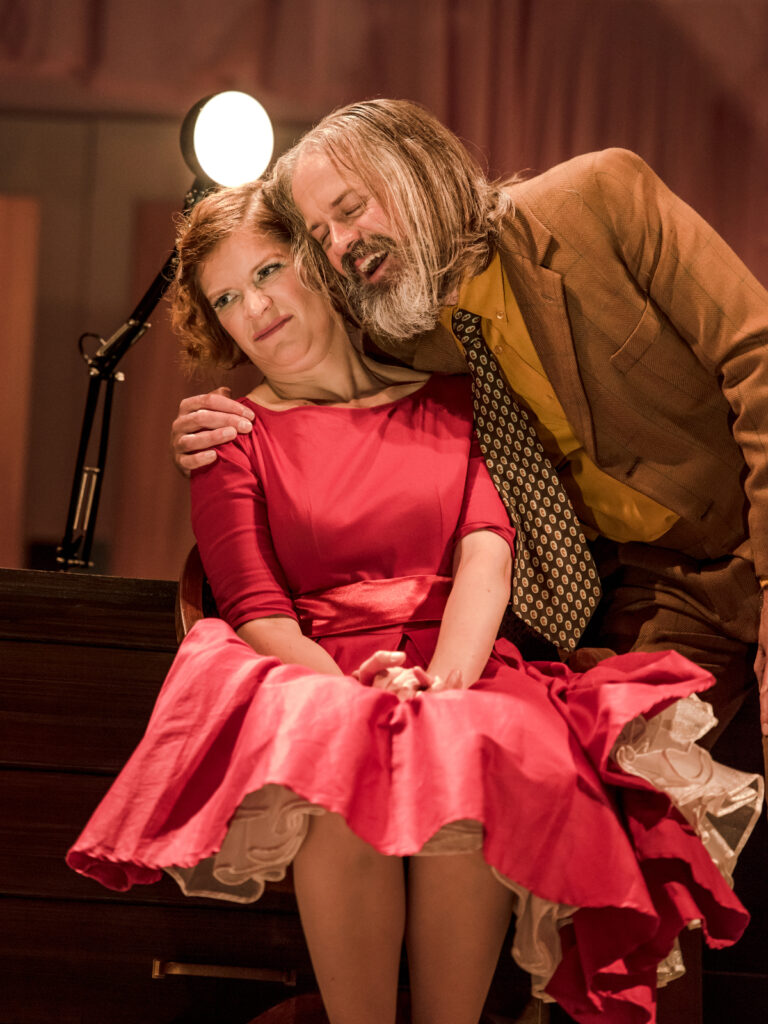
Of the main principals, however, the strongest performance comes from Grant Doyle, whose baritone is masterly and who cannot help but make us feel sorry for Dr Bartolo as all of his assertions on how he cannot be outwitted are proven wrong.
musicomh, Sam Smith, 25 Jun 2022
Grant Doyle’s Dr Bartolo was very much a sleazy curmudgeon, the humour arising because of the mismatch between the character’s view of himself as a lothario and the reality of his approach and looks. Also, the production did not shy away from the fact that there is an element of nastiness perhaps even violence to the character which can often be overlooked in a pure buffo performance. Doyle certainly had great fun laying it on, and perhaps we were less sympathetic than usual at the old man’s come-uppance.
planethugill.com 27 June 2022
The Golden Cockerel – English Touring Opera (Spring 2022)
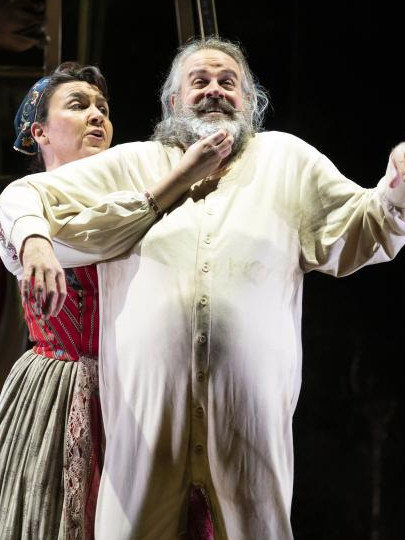
“King Dodon (pronounced the French way) features the strong-voiced baritone Grant Doyle, who sports a variety of costumes including some amusing underwear. Doyle was an exceptional Forester (The Cunning Little Vixen last year at Opera Holland Park, and before that as Robert in Iolanta; he owned the authority of his role here while embracing the King’s faults and frequent silliness.”
seenandheardinternational, 07/03/2022 by Colin Clarke
“Grant Doyle was a magnificent King Dodon, creating an engaging idiot of a character yet singing finely. This is a big role, Doyle was on stage for a lot of the time and he was a pleasure to listen to. And it was truly unnerving to watch someone having so much fun, yet knowing that this fun was leading to catastrophe.”
planethugill.com 7 March 2022
“Gerry Cornelius conducts extremely well, while Grant Doyle with his secure baritone is an excellent Dodon. He is very clever at playing up the Tsar’s bumbling, doddery and lazy nature, even indulging in a dance routine that would rival David Brent’s, so that he feels quite loveable. The consequence is that we have to remind ourselves constantly that there is nothing sweet or innocent about his actions or attitude to ruling..”
musicomh.com – Sam Smith, 5 March 2022
Cunning Little Vixen – Opera Holland Park
(Summer 2021)
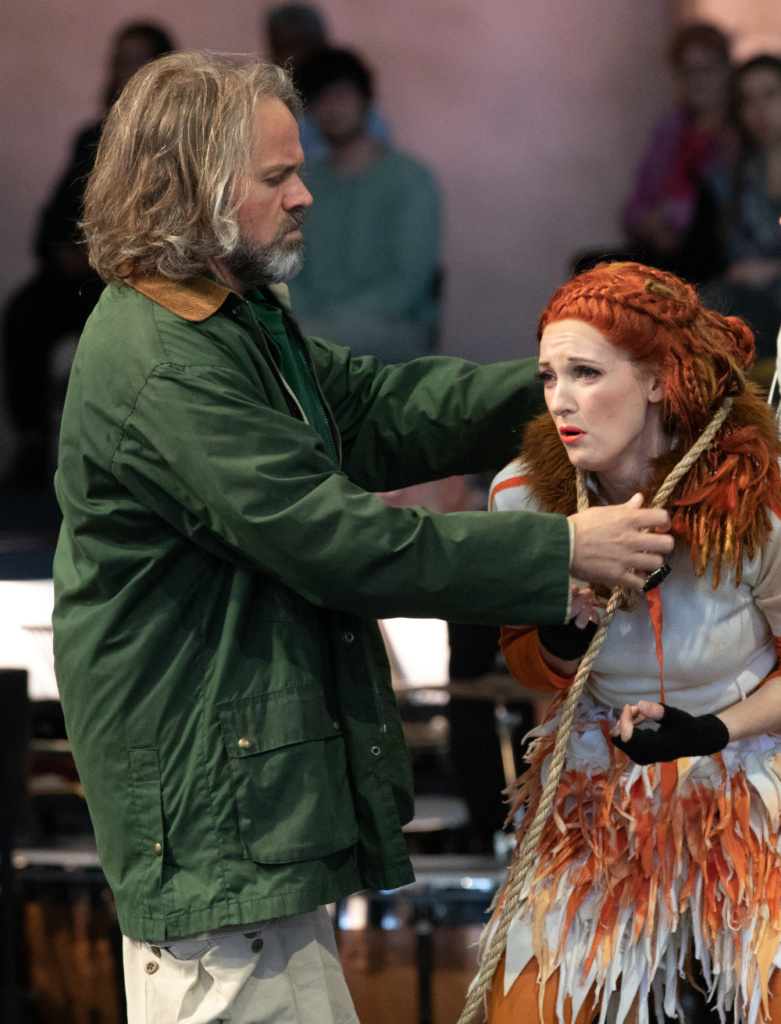
Grant Doyle also excelled as the Forester…He convincingly embodied the weariness and elegiac qualities of the role, and sang with
Benjamin Poore, Operawire
remarkable clarity of diction”
Seeing and hearing Grant Doyle (previously seen in Tchaikovsky Iolanta) as the Forester was a treat, not least in that final Hymn to Nature. Doyle paced his assumption of the role as if his every contribution in the opera led to those final uplifting moments.
seenandheardinternational, 14/07/2021 by Colin Clarke
Grant Doyle sings his noble epilogue about the passing of time and the meaning of life with total security, and seven years on from playing the Forester in Daniel Slater’s brilliant production for Garsington, he’s also won the right to mediate on ageing.
theartsdesk, David Nice 14 July 2021
Macbeth – English Touring Opera
(Spring 2019)
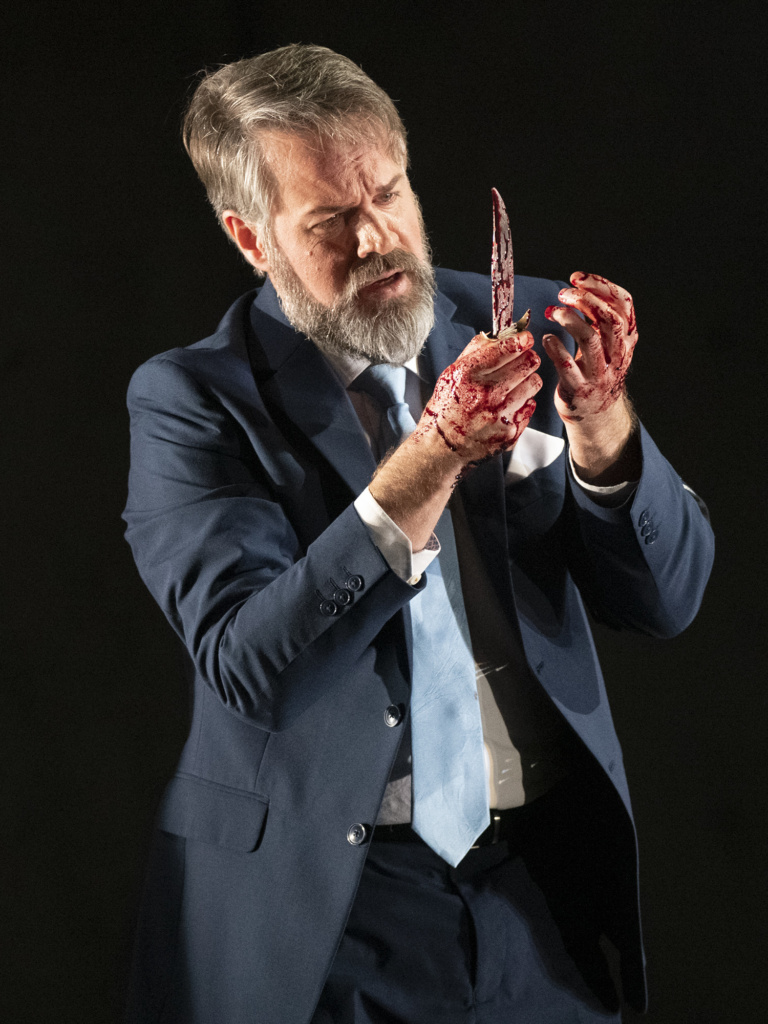
[Grant Doyle] sings the role with such unforced strength and, in his closing aria, stylish musicianship that audiences round the
Richard Fairman, Financial Times ****
country should count themselves lucky to have him.
“Grant Doyle carried the role on vibrant, forthright tone and, having somehow retained an air of humanity throughout the murder
Yehuda Shapiro, Opera Magazine
and mayhem, filled Pietà, rispetto, amore with regret.”
“Grant Doyle combines Macbeth’s monstrous pessimism, his courage and agonising moments of self-knowledge with disarming directness. This is a commanding performance, and Doyle has the vocal resources and dark Italianate inscrutability to give the role full measure. He also has a hollow softness for a devastating and desolate account of Macbeth’s Act Four aria, when he realises the game is up.”
classicalsource, Peter Reed, 9 March, 2019
“It sounds good, too. Doyle’s declamatory way with the opening scenes gives way to a fierce, expressive lyricism as guilt and isolation begin to corrode both Macbeth’s mind and his sense of his own integrity.”
The Guardian, Tim Ashley, 10 March 2019
“Grant Doyle was a forceful, multi-faceted Macbeth, capturing the early torment and moral decline with subtlety. Vocally he was imposing, (and) he brought an appropriate sensitivity and drama to key moments, most noticeably the banquet scene and the finale.”
bachtrack, Dominic Lowe, 11 March 2019
“Fascinatingly, Grant Doyle as Macbeth traced the opposite vocal trajectory. Relatively pale in his earlier scenes, successive moments of crisis seemed to ignite a volcano: a thunderous torrent of tone at the sight of Banquo’s ghost, and a ringing, really heroic resolve – almost a sense of relief – as he faced his violent doom at the hands of Macduff. And when the king and queen are so right, it’s hard for much else to go wrong with Macbeth..”
theartsdesk, Richard Bratby, 26 March 2019
Radamisto – English Touring Opera
(October 2018)
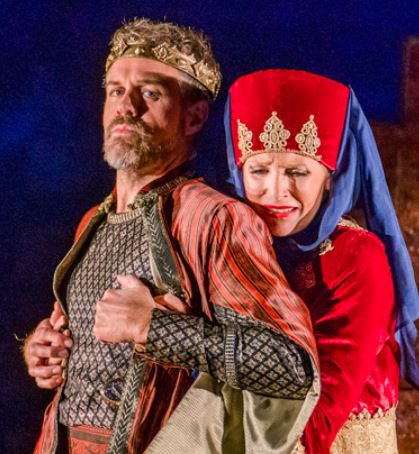
“…and the cruel rasp of Grant Doyle’s Tiridate underlines the sheer physicality of this performance.”
The Independent, Michael Church, 8 October 2018
“Grant Doyle threatens to overturn the opera’s moral compass by endowing the old-world, male chauvinistic pig Tiridate with surpassing power.”
The Financial Times, Richard Fairman, 11 October 2018
“Grant Doyle is an ideal Handel baritone. Dramatically, his Tiridate is a little restrained, so never ventures into comedy villain territory.”
The Arts Desk, Gavin Dixon, 9 October, 2018
“…in firmly rejecting the outrageous advances of Grant Doyle’s rampantly villainous Tiridate.”
Opera Now, George Hall, October 2018
Rigoletto – Opéra de Baugé (July 2018)
“On touche là à l’une des forces de l’Opéra de Baugé, cette capacité à recruter des voix jeunes mais déjà engagées dans la carrière et qui peuvent ici incarner des premiers rôles qui vont constituer des jalons pour eux. Ainsi du baryton anglais Grant Doyle : il a exactement la voix de Rigoletto, timbre corsé et bien projeté, netteté des attaques, richesse et souplesse des phrasés (superbe « Pari siamo » au premier acte), intensité expressive à la tension qui jamais ne retombe (« Cortiggiani » au deuxième acte), soutien parfait qui lui permet de tenir la scène finale avec une force bouleversante.”
opera-online.com, Alain Duault, 30 July 2018
The Skating Rink – Garsington Opera
(July 2018)
“Doyle gave a beautifully crafted, multilayered performance which really brought the character alive and, surprisingly, made us begin to sympathise with him.”
Planet Hugill, Robert Hugill, July 2018
“Grant Doyle grows in stature as the evening progresses as his expansive baritone comes into play to carry off the largest role with aplomb.”
musicOMH.com, Sam Smith, July 2018
“First in an ensemble of equals is Grant Doyle, a busy singer who couples a gorgeous baritone with the best diction on the circuit.”
What’s On Stage, Mark Valencia, 13 July 2018
“Garsington has assembled a great cast. The focus is Grant Doyle as Enric. He sings with burnished tone throughout and is dramatically effective.”
Classical Source, Alexander Campbell, 5 July 2018
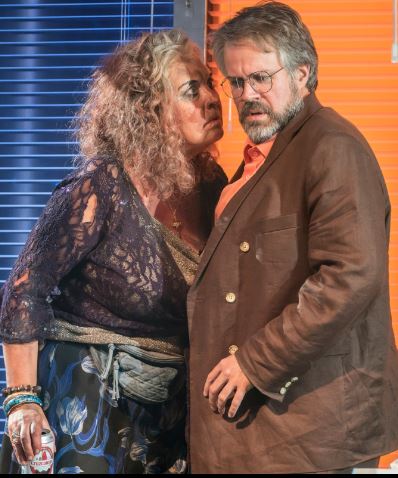
The Pearl Fishers – State Opera of South Australia (May 2018)
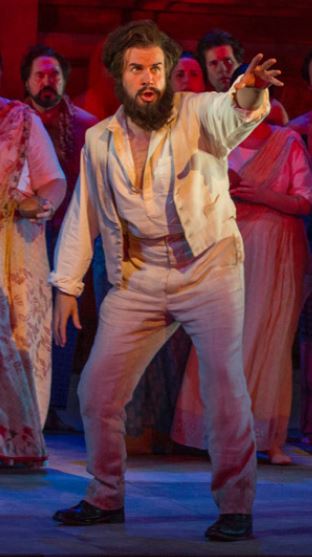
“Doyle’s resonant voice gives gravitas to his character as he takes us on an emotionally charged roller coaster ride through Zurga’s mood swings. Zurga’s ultimate understanding and change of heart is a profound moment in Doyle’s hands.”
broadwayworld.com, Barry Lenny, 14 May 2018
“Grant Doyle returns to the role of Zurga which he sings with great passion, great insight. His big aria after he has condemned to death the man he adores is deeply moving, exposing the turmoil in his heart.”
The Advertiser, Ewart Shaw, 22 May 2018
Die Zauberflote – Longborough Festival (July 2017)
“Grant Doyle made the ideal comic, cocky Papageno, his German crisp, clear and expressive, his timing perfect (even down to an irresistible Brexit joke) and his baritone endlessly generous.”
bachtrack.com, Charlotte Valori, 18 July 2017
The Queen of Spades – Opera Holland Park
(August 2016)
“…the well-rounded portrayal of Grant Doyle as Prince Yeletsky, so wonderful in the ball scene with Lisa, showed serious quality…”
Mark Ronan markronan.com, 5 August 2016
“Grant Doyle’s Yeletsky was very fine indeed: darkly conflicted, and beguiling of line.” Opera Today, 4 August 2016
Le nozze di Figaro- Longborough Festival Opera (July 2016)
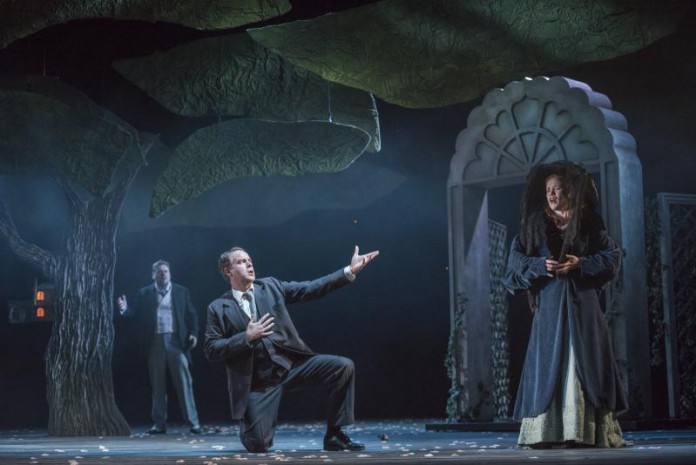
“…the singing is generally of a high standard, with Grant Doyle as Figaro revealing a powerful and rounded baritone.”
Sam Smith, musicOMH, 28 June 2016
“Figaro himself doesn’t deliver a political tirade in the opera like the one in Beaumarchais’s play, but he does behave in that spirit, and there is a fine, confident insolence about Grant Doyle’s portrait, backed up by superb, genuinely basso quality singing that emphasises, as Mozart surely intended, Figaro’s weightier character compared to the flighty, unscrupulous baritone Count.”
Stephen Walsh, the artsdesk.com, 27 June 2016
“…the singing was uniformly excellent, with the vocal highlights coming from Grant Doyle’s Figaro.”
David Lister, Independent, 4 July 2016
Pia de Tolomei – English Touring Opera
(March 2016)
“Grant Doyle gave a really barnstorming performance, singing the role with a fantastically full, robust yet flexible line. In Act Two we really came to appreciate the conflict in the character, in a beautifully rounded performance.”
Robert Hugill, Planet Hugill, 12 March 2016
“As Nello della Pietra, Grant Doyle presented a convincing and sympathetic portrait of jealousy and repentance. His aria, ‘Lei perduta in core ascondo’, rocked with doubts and self-doubt. Doyle had great presence, due in no small part to his substantial, agile baritone; but he also moved commandingly around the small stage area.”
Claire Seymour, Opera Today, 10 April 2016
“Nello is required to bellow a lot, but Grant Doyle did much more than that. He was superb in his attack-mode confrontation with Pia, piling on the emotion and confirming his gifts as a sympathetic singer-actor.”
Peter Reed, Classical Source, 10 March 2016
“Doyle’s sonorous, majestic baritone served a characterisation that moved from affronted arrogance to desperate pain without varnishing one or blunting the other….Who says you need to be at a major opera house to hear singing of this quality?”
Richard Bratbury, The Arts Desk, 25 April 2016
“Grant Doyle asserted Nello’s dominance powerfully, while crucially also doing justice to the character’s softer side…”
Yehuda Shaprio, Opera Magazine, April 2016
“Grant Doyle is in magnificent voice as Nello, his burnished baritone sounding ever richer and his Italian beautifully clear.”
Charlotte Valori, Bachtrack, 14 March 2016
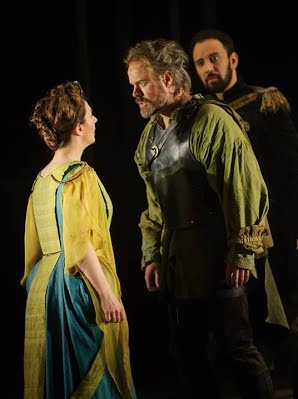
Iphigénie en Tauride – English Touring Opera
(March 2016)
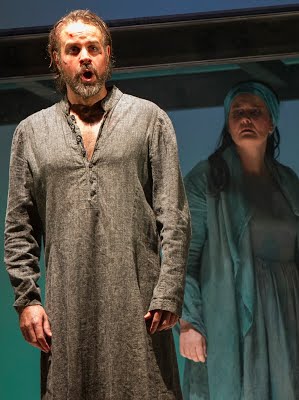
“Grant Doyle’s warm and powerful baritone makes for a charismatic Oreste, wholeheartedly determined on his own death and almost impossibly self-absorbed, though not quite as mad as the libretto might indicate: Doyle gives us a man who has actively decided to give up on life (though his singing never fails to deliver).”
Charlotte Valori, bachtrack, 29 March 2016
“Grant Doyle excelled as the riven Orestes, furious and declamatory, then desperate for inner peace while the jagged accents interjected by conductor Martin Andre betray a tortured conscience.”
Colin Davison, Gloucestershire Echo, April 16, 2016
“As her mentally unstable and distraught sibling, Grant Doyle sang with power and, at times, nuance. The baritone had warmth and power, with steady weight complemented by varied colour, and if he tried too hard occasionally then episodes such as when Orestes awaits death, in Act 2, were sensitively delivered.”
Claire Seymour, Opera Today, 10 April 2016
Don Giovanni – State Opera of South Australia (May 2015)
Barry Lenny, Broadway World, 23 May 2015
“Baritone, Grant Doyle, oozes self-confidence and lust, striding boldly around the stage, making every square millimetre his own. Our first sight of him is looking like a male erotic model version of Zorro, the Knee high black boots and hot pants making the distinction between the hero and the villain. Intakes of breath could be heard all around me. Doyle brings a high level of sizzling sexuality to the role that makes it all work, proving that opera singers today can act and move, as well as sing magnificently.”
“Adelaide-raised Grant Doyle is absolutely superb as the womanising, morally bankrupt Don Giovanni, cutting a debonair swathe across the stage, alternately ‘loving’ and leaving a myriad of maidens in his wake. He is at once rakishly attractive yet also darkly despicable – creating a quandary of sorts – you can’t help but connect with the character, all the while abhorring his many dastardly deeds. Doyle is able to easily portray these elements, his acting and rich baritone performance keeping all eyes firmly on Giovanni’s antics.”
Rosie van Heerde, The Clothesline.com.au, May 2015
“State Opera provides a vehicle for local talent and it is gratifying to see Grant Doyle playing Giovanni with such style and complete command of the stage. Doyle has a magnificent baritone voice and he is the living proof that opera singers can act convincingly while also singing beautifully. (He) presents the charm and the attractive aspects of his character but, equally, allows his egocentric and violent manner to be apparent.”
Greg Elliot, InDaily Magazine, 25 May 2015
“Grant Doyle reveled in the role of Don Giovanni. His rich baritone voice was uniformly strong across the register, and he cut a very swashbuckling and rakish figure. He was animated in the extreme, and convincingly portrayed Don Giovanni’s final slide into depravity.”
Kim Clayton, Barefoot Review, May 2015
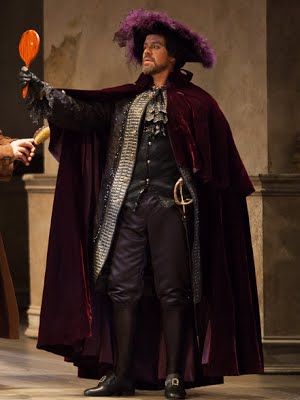
La bohème – English Touring Opera
(March-April 2015)
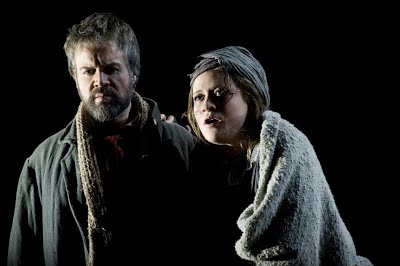
“His bromance with housemate Marcello works as well as his love affair with poor Mimì. Grant Doyle, vocally bigger and a bit gruffer than of old, lends his substantial baritone and top-drawer acting skills to the struggling painter, forming convincing relationships not only with his flatmates but also with Sky Ingram’s splendidly emphatic and musically refulgent Musetta.”
Mark Valencia, What’s on Stage, 15 March 2015
“Grant Doyle was in excellent voice as Marcello, combining the slightly idealistic artist with the hopelessly tempestuous romantic, his chemistry with Ingram cracklingly good.”
Charlotte Valori, bachtrack, 16 March 2015
Iphigénie en Tauride – Pinchgut Opera (December 2014)
“Doyle is a stentorian baritone in the best sense, projecting great passion through the voice and capturing Orestes’ sense of doom and fury-haunted desperation. … This is a very potent performance packed with first class singing.”
Clive Paget, Limelight Magazine
‘Grant Doyle is a stunning Orestes, occupying the role with a profound sense of fate, all the more devastating for its restraint. Vocally, he doesn’t hold back, unleashing one of the smoothest, most agile baritones I have heard in a while.”
Harriet Cunningham, The Sydney Morning Herald
“Baritone Grant Doyle also impressed as Iphigenie’s tormented brother Oreste. Maintaining a burnished, smoky toned timbre, he captured his character’s anguish, seamlessly shifting from quietly smouldering resentment to explosive rage.’
Murray Black, The Australian
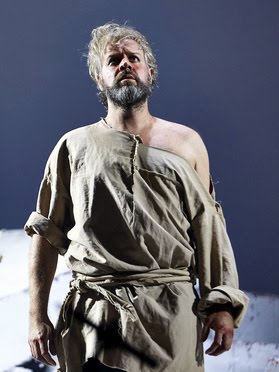
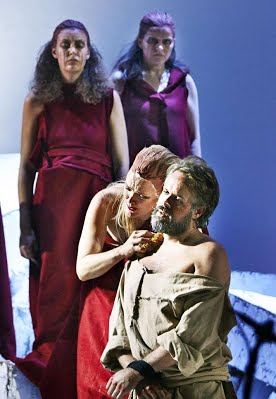
“We know Oreste is her brother, electrifyingly powered by baritone Grant Doyle. Hulking in stature and voice, but soft as marshmallow inside, Doyle grasps Oreste with determined strength as he wills his life to be sacrificed for his friend Pylade. In his Act II opening aria, Dieux, à quelle horreurs m’aviez-vous réserve?, Doyle, immediately impresses and you wonder if he can find the reserve to sustain his performance, but he never disappoints, equally able to extrude a pianissimo of shapely beauty.’
Paul Selar, bachtrack
“… Like Hulcup, Doyle, a baritone, has a big voice and, like a hulking V8 in an old school, wide-tracked, gas-guzzling, befinned American car, one senses, thanks to lusty torque, plenty in reserve. Unlike one or two more celebrated ‘bassists’, too, his register sacrifices not one iota of diction. To boot, he’s a convincing actor, vividly portraying the torment of a man who’s killed his mother, for killing his father; an exercise in the most dubious of poetic justices.”
Lloyd Bradford Syke, Daily Review
Ottone – English Touring Opera
(October 2014)
“Grant Doyle’s warm, eloquent tone assures us of princely virtue behind the piratical façade.”
Barry Millington, Evening Standard, 20th October, 2014
“Grant Doyle was suitably forthright and characterful as the pirate Emireno”
Planet Hugill, 18th October, 2014
“…the vocal riches are real, with strong performances from … Grant Doyle’s rich-toned Emireno.”
Edward Bhesania, The Stage, 20th October, 2014
“Grant Doyle, as the pirate Emireno, brings a bit more gravitas to proceedings, his baritone silky and effortless.”
A Younger Theatre, Guy Withers, 21st October, 2014
Cunning Little Vixen – Garsington Opera
(June 2014)
“As Grant Doyle sang out sonorously in the Forester’s closing paean to nature, the sun was setting outside over the Wormsley estate, art and nature in sync. Janáček would have approved.”
Richard Fairman, The Financial Times 23rd June, 2014
“The human story of the villagers – perfectly exemplified… especially, Grant Doyle’s expertly sung and superbly acted Forester – comes into sharp focus in the foreground.”
George Hall, The Stage, 23rd June, 2014
“Doyle has a particularly impressive musical presence, is seemingly unfazed by the wide tessitura, and gives as much emotion as the part requires, especially in the tricky final scene, which succeeds spectacularly…”
Gavin Dixon, Bachtrack, 26th June, 2014
“Chief among the hapless males is her captor the Forester, big-voiced and yet vulnerable in baritone Grant Doyle’s fine portrayal.”
The Observer, 29th June, 2014
“As the Forester, Doyle brings exactly the right mixture of lyricism and muscularity, particularly in his rhapsodic final musings on circles of life (and the closing image of him silhouetted against a setting sun was glorious). “
What’s on Stage, 24th June, 2014
“Grant Doyle, always an interesting actor-singer, gave the Forester enormous stature – this was the biggest role I’ve seen in him and he was gripping throughout – and his paean to nature as he moves into the sunset inside the theatre as the dusk gathered outside it was pure magic.”
Classical Source, 16th June, 2014
“The stars are … Grant Doyle’s warm-toned, alluring Forester… Any of the top opera houses would be graced by such a quartet of principals. Doyle’s progress from a merely good Don Giovanni to this rounded, superbly sung characterization, is a joy to see”
OMH 23rd June 2014
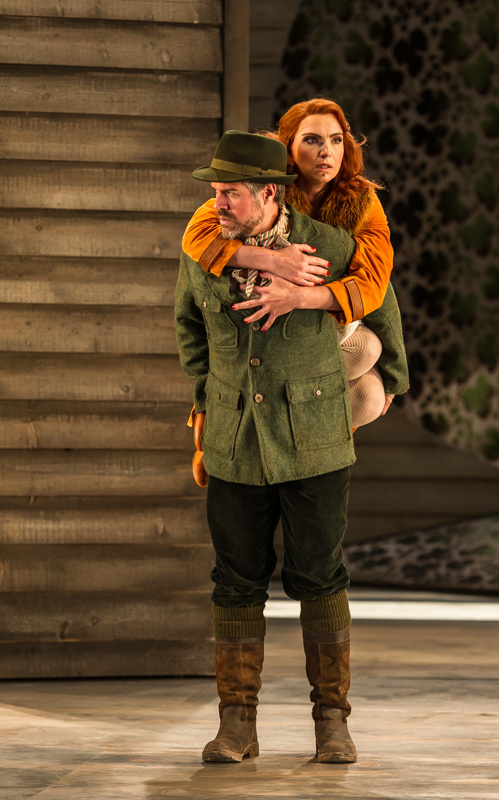
Turandot – Royal Opera House, Covent Garden (February 2014)
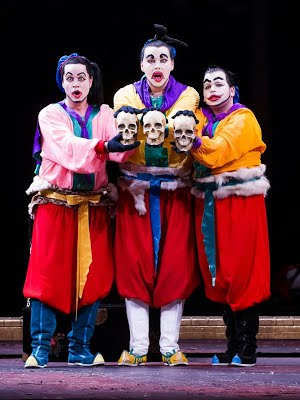
“…there was an added bonus in the performances of Grant Doyle, David Butt Philip and Luis Gomes as Ping , Pang and Pong. This trio brought real panache and vocal allure to the parts, making their nostalgic musings in Act 2 unusually affecting …”
Opera Magazine, April 2014
“The trio of homesick ministers is of high quality: David Butt Philip repeats his fine Pang, but the real step-up comes with the new Pong – Luis Gomes – and Ping – Grant Doyle – which makes for a richer, more sonorous ensemble than before.”
Opera Britannia, February 18th, 2014
“Grant Doyle’s confident and musically intelligent Hector sings everyone else off stage.”
King Priam/English Touring Opera, The Times, February 2014 (Hilary Finch)
Pearl Fishers – Opera Holland Park
(June 2013)
“Australian baritone Grant Doyle was a characterful Zurga, establishing a powerful stage presence and alert to every dramatic gesture and detail. Doyle sang with a credible dark tone and rich warmth, particularly in his Act 3 aria, ‘L’orage est calmé’ as both the natural tempest and his own anger quieten.”
Opera Today
“Doyle was a commanding yet sensitive Zurga. He shaped his phrases with a baritone voice that at times verged on being too covered or too dark, but the quiet pianissimos he achieved, notably in his final “Rêves d’amour, adieu”, certainly caught me with a lump in my throat. He was resoundingly effective and emotionally compelling.”
MusicalCriticism.com, July 2nd 2013
“Grant Doyle’s Zurga was solid and carefully inflected, bringing an older, softer colour to this rivalry than we sometimes see. His “L’orage est calmé” was nicely underplayed, bringing the evening as close to truthful emotion as it managed, and he acquitted himself honourably in “Au fond du temple saint”
The Arts Desk, June 26, 2013
“Grant Doyle as Zurga had a commanding, anchored presence and sang the role beautifully…his fury in Act 2 hit the spot, as did the authority and passion of his big Act 3 aria ‘L’orage s’est calme’ “
Opera Magazine
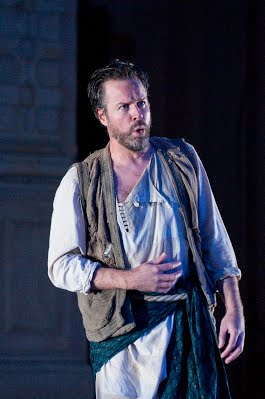
“Grant Doyle’s sinuous Paolo … summed up the opera’s unremittingly dark character with panache, and rather stole the title role’s thunder.”
Simon Boccanegra/ETO, Daily Telegraph, March 13 2013
“A plonky prologue is redeemed by the magnificently cast … Australian-born Grant Doyle. Doyle is a number one performer, as Simon’s estranged former ally Paolo, who pays with his life for a collapsed coup.”
Simon Boccanegra/ETO, Arts Desk Review, March 9 2013
“The baritone Grant Doyle had the essential elegant bearing for Onegin and, with a dark warmth to his sound, was not wholly unsympathetic in character. If Onegin is too chilly and cynical his change of heart in Act 3 is even harder to realise, and Doyle managed this very well”.
Eugene Onegin/Opera Project, Opera Magazine, January 2013
“In the title role of Onegin, Australian Grant Doyle’s rich and mellifluous baritone is a pleasure to listen to as always..”
Eugene Onegin/Opera Project, thepublicreviews.com, October 2, 2012
“Grant Doyle as Figaro has huge presence and magnetism; he out performs everyone else as Figaro should; the servant who empowers the action and controls his aristocratic masters, and so called betters.”
Barber of Seville/ETO, N16mag, March 2012
Don Giovanni – Garsington Opera
(June 2012)
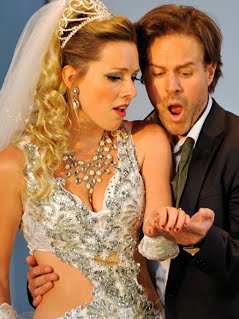
“The Australian baritone Grant Doyle was perfect as the dastardly Don, combining a fine, powerful voice with a splendid swagger and confident and energetic movements around the stage that emphasised his irresistibility.”
Daily Express, June 13 2012
“In the title role, Grant Doyle sounded appropriately virile and was a strong stage presence as well as a convincing lead. His serenade ‘Deh vieni alla finestra’ was a highlight, with the most delicate of plucked, mandolin-style orchestral accompaniments miraculously audible above the sound of heavy rain outside.”
Bachtrack, June 2012
“I found this radical take on the libretto consistent and refreshing, splendidly cast, with outstanding performances by a wonderful-looking Grant Doyle as Giovanni…”
Wall Street Journal, June 2012
“There was a vocal and theatrical strength in the cast that made Slater’s job easier. Grant Doyle (pictured with Mary Bevan left) and his aggressively floppy hair were made to play Mozart’s semi-seductive baddies. As with his Almaviva a few years back, his Giovanni was laced with a compelling menace throughout, a rendition that had just enough charm that you could understand why Elvira would return to him. “
The Arts Desk, June 2012
“His clear diction, convincing acting and easy stage presence and athleticism add to the strengths of his nicely tuned bass baritone voice. His is a name to watch.”
Robert J Farr, Seen and Heard International, June 2012
“Grant Doyle is a fine Don Giovanni, floppy-haired and dapper in jacket and jeans, looking like Alfie Boe on a chat show. His mellifluous, swaggering baritone (wonderfully sotto voce in his second-act serenade, ‘ Deh vieni alla finestra’) is complemented by the darker hues of Joshua Bloom’s Leporello, and both of these fine performances help to cement the musical side of things.”
Mark Valencia, Classical Source, June 2012
Moby-Dick State Opera of South Australia (August 2011)
“…but the vocal honors ultimately go to baritone Grant Doyle, who dominates the stage as the tortured Starbuck. Doyle sings with line and great intelligence, easy across his entire range in what is a very demanding role.”
The Barefoot Review, August 2011
“Adelaide-born Grant Doyle as Starbuck has a finely controlled baritone, used here to great effect as the rational but devout mate. His soliloquy was touchingly sung….”
Opera Britannia, September 2011
“….around him are some of the finest actor-singers you’ll see in years. Grant Doyle as first mate Starbuck, in every moment, every gesture, communicates the depths of longing that fuel his spirit.”
Advertiser, August 2011
Clemency ROH2 Linbury Studio (May 2011)
“Grant Doyle led the cast as Abraham in a beautifully-judged piece of singing that brought authority without bombast to some of MacMillan’s loveliest writing.”
Clemency/ROH Linbury, New Statesman, May 2011
“Grant Doyle sings Abraham with a pure, uncomplicated richness one could happily listen to all night”
Clemency/ROH Linbury, The Stage May 2011
“Abraham, the full-toned Grant Doyle, is straightforward, humble but tenacious.”
The Independent, May 2011
“Grant Doyle was a powerful vocal and stage presence, and breezed through the demands the music made of him.”
classicalsource.com, May 2011
Le nozze di Figaro – Garsington Opera (June 2010)
“…at the top of the Almaviva household, Grant Doyle shades the licentious Count with plenty of dark virility.”
Le nozze di Figaro/Garsington, Times, June 2010
“Grant Doyle had the greater stage experience, and it showed: this Count was lithe, energetic, a dangerous man to cross. But thankfully – as he is indeed crossed, time after time as the opera progresses – Doyle found the happy medium between grand seigneur and comic dupe. His voice is on the light side, but the timbre is attractive and Doyle sang cleanly and crisply throughout.”
musicalcriticism.com, July 2010
Ruddigore Opera North (February 2010)
“The always likeable Grant Doyle blossoms with star quality as Robin Oakapple.”
Daily Telegraph, February 2010 (Rupert Christiansen)
“Sir Ruthven’s (Grant Doyle) often-cut aria about “all the crimes one sees in the Times” acquires an extra verse about MPs’ expenses, which was cheered to the rafters by the first-night audience. The singing is consistently fine: Doyle, gauchely attractive, and the glorious sounding Freston are outstanding.”
Guardian, February 2010
“Opera North’s cast fielded some wonderful acting talent and it is hard to imagine a more ideal Robin/Ruthven than Grant Doyle. His warm, elegant baritone was attractive in timbre and he sang with great polish and finesse throughout; making light work of the fast patter songs and getting the text across with impeccably clear and suitably posh diction. His acting and comic timing were brilliant – obviously a G&S ‘natural’, Doyle made a very affable hero in Act I and a very sympathetic villain in Act II.”
Opera Britannia, February 2010
“We have the utterly winsome Grant Doyle as hero/antihero Sir Ruthven Murgatroyd…both performers are masters of lightning-quick enunciation and are gloriously funny. Their performances are an utter joy.”
Newcastle Evening Chronicle, November 2011
“Grant Doyle’s warm and well nourished baritone is a revelation to those of us brought up on much lighter voices in the dual role of Robin Oakapple and Sir Ruthven Murgatroyd. Doyle’s delivery of the patter songs is just as razor sharp as the classic D’Oyly Carte principal comedians of yesteryear. “
Opera Britannia October 2011
“…Grant Doyle a bright-voiced, outgoing Marcello…”
La Boheme/Opera Holland Park, Opera Magazine, August 2009
“The role of the Christus finds Grant Doyle both dignified and detached.”
St John Passion/Irish Chamber Orchestra, Irish Independent, March 2008
“…baritone Grant Doyle sang with resounding, full-voiced power as King Philip II…”
Don John of Austria/Sydney Symphony, The Australian, October 2007
“Equally as impressive was the carefully phrased and thoughtfully acted Frederic of Grant Doyle.”
Lakmé, Opera Holland Park, Opera Magazine, August 2007
“…the superb Grant Doyle (a former Young Artist at the Royal Opera) really stepped up to the mark with his beautifully-sung Frédéric….”
Lakmé, Opera Holland Park, Musical Criticism, August 2007
“…solo baritone Grant Doyle, whose strong and malleable voice moulded phrases of great dramatic potency throughout.”
A Child of Our Time/Barbican, musicOMH.com, January 2007
“The lovers too are a pleasing group vocally… the twists and turns of their amorous engagements and disengagements need the clearest exposition, and here Grant Doyle’s Demetrius makes a consistently full-on impression…”
A Midsummer Night’s Dream, Royal Opera House Independent, December 2005
“From an otherwise outstanding cast, highlights are … Grant Doyle’s golden-voiced Demetrius…”
A Midsummer Night’s Dream, Royal Opera House The Stage November 2005
“…Some of the smaller roles were also disinctively sung, most natbly by Jonathan Lemalu, Mark Stone and the wonderful former Young Artist, Grant Doyle (Bello)….”
La fanciulla del West/Royal Opera, musicOMH.com, October 2005
“…(The) bohemians are a highly coloured, sharply differentiated team, of whom Grant Doyle’s Schaunard is outstanding…”
La boheme/Royal Opera, The Spectator, July 2005
“Diana Damrau, all shuddering trills and cleavage, generated a formidable erotic charge with Grant Doyle’s punkish, fatigues-clad Harlequin. The evening is well worth it for the pair of them…”
Ariadne auf Naxos, Royal Opera House , The Guardian, June 2004
“…It is medals all round for this cast, down to the smallest roles. Grant Doyle’s Harlequin is distinguished…”
Ariadne auf Naxos, Royal Opera House The Stage, July 2004
“…Grant Doyle’s Harlequin who is a bit of rough, nicely stole the show…”
Ariadne auf Naxos, Royal Opera House The Independent, July 2004
“Christine Rice was partnered by the dangerous, even reckless Tarquinius of Grant Doyle, whose forthright tone and skilled fitting of words to notes were huge assets in the role.”
Rape of Lucretia, Royal Opera House, Opera News, July 2004
“Grant Doyle as the assailant Tarquinius, struts with repellent arrogance yet sings with sensuous languor..”
Rape of Lucretia, The Observer, May 2004
“I also liked the forthright and passionate Marcello of Grant Doyle, who made the most of his stormy love affair with Musetta…”
La Bohème, Royal Albert Hall, Sunday Telegraph February 2004
“A mention must be made of the Marullo of Grant Doyle, who discovered a great deal in a vital yet often overlooked minor role.” Rigoletto, Royal Opera House Opera December 2002
“…..the whole success of this production depends on the pivotal role of Figaro and Grant Doyle is in complete control vocally and physically, bringing an easy charm to enhance this sparkling production. Definitely a name to watch.”
Barber of Seville/Clonter Opera, The Stage, May 2001
“…..Star of the show was Grant Doyle as Figaro. From the moment he entered the action with his voice echoing all around the auditorium he was the very model of the Factotum: witty and sly, with body language to match his forthright singing…..”
Barber of Seville/Clonter Opera, Manchester Evening News, May 2001
“Charm in abundance dripped from Grant Doyle’s Rafaele, whose soap-star looks combined with an even lyric baritone to make him an irresistable villain”
Opera Now July/August 2000
“The Owen Wingrave was outstanding: Australian baritone Grant Doyle with a striking presence and a dark-gold vocal beauty that should see him into a significant career.”
Independent on Sunday, UK July 4 1999
“…..I was bowled over by Grant Doyle’s Owen, an admirable portrait of genuine integrity. He fields a dark, flexible baritone of wide range and power, which he used with a sure command of nuance and tone, singing off words with youthful ardour and committment. Here is a potentially great Billy Budd…..”
The Stage, July 1999
“….Among the singers, more than one is destined to reach international fame very shortly: Australian Grant Doyle, for example, a Count with a brilliant voice who recreated the acute arrogance of the ancien regime in a way that is rarely seen…..”
OpernWelt, April 1999
“….The pace-setter and ultimate winner of the evening was an Australian baritone, Grant Doyle, who turned the Count into a figure of menace, poutingly sensuous…..”
The Times, February 1999